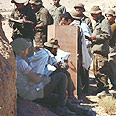
Soldiers praying
Working by my father's side in the Emergency Ward at Be'er Sheva hospital I remember the piercing screams, the intense psychological pressure, the smells of dirt, fumes, blood soaked uniforms and burnt flesh.
The horrendous noise as the helicopters landed on the lawn outside and the rush of everyone to lend a hand and join the struggle to bring in all the casualties, trying not to bump them, trying not to add to their excuciating pain.
We lined them up on the floor one next to the other - young men, older men, young boys or at least they appeared to be young boys. Israelies and Arabs, people without hands, arms, feet, legs. People without an eye or an ear. People who had bandages holding their heads together their heads having been split open. Some unconcious, others moaning in agony, some sobbing or screaming, others in complete shock - total silence - unaware of their surroundings or of their condition.
My father was the resident plastic surgeon and he specialised in burns and reconstructive surgery.
The first four days we did not leave the emergency ward. No one slept, there was nowhere to sit down except on the stairs, I don't remember eating and drinking although I am sure we did at some point.
I do remember the faces and the injuries. Following the arrival of one of the helicopters I was asked to go around to each soldier and collect all their personal items and put them in a special bag which was tied on to them so that they wouldn't be seperated.
I remember one young soldier whose head was turned away from me. I asked him if he knew where his other shoe was. He didn't answer so I lifted the blanket which was covering his legs. He only had one leg, the other had been blown off above the knee. I felt an unnerving shock wave go through me as I stared at what was left of his leg.
Another had both legs except that below the knees they were a blend of flesh and tiny chips of bone - there was no form to it- his vehicle had gone over a mine and crushed the lower part of both legs.
These cases were considered non-emergency cases and were being prepared for the trip up north to another hospital. Anyone who could survive a two-hour trip was put into buses and trucks and taken away. One young man begged me not to let them take him since any movement was agony. His eye had been badly injured and was being held in position by bandages. I felt helpless. All I could do was stay with him until they came to take him.
I never saw any of these people again and I have often wondered what happened to them.
The more serious cases were on the other side of the hall. A sixty percent burn which my father took upstairs. The other doctors said it was a waste of time to try. But my father said if the kid had the will to survive he might make it.
The doctors were standing around a soldier and they began unwinding the bandage on his head. My father was on one side, I was not far away. I saw my father move suddenly catching something. It took me a few moments to realise that what I was seeing was part of the skull and the brains of the soldier in my fathers hands. The bandage had held this part of his head in place.
I remember the terrible strain on the nurses and how many of them broke down on the second and third days unable to distant themselves, they were overcome with grief and emotion and could no longer continue to function.
On the fifth and the sixth day which we had expected to be the worst, there was a slight easing of pressure and less helicopters arrived than had been anticipated. As a result the pressure dropped and I remember collapsing and everything went dark as I fell into a deep deep sleep.
I have broken pictures of people running doubled over and straining to carry stretchers from the helicopters into the emergency ward. I have framented images of my father moving with determination checking bed after bed, stretcher after stretcher making one decision after the next, who can live long enough, who needs immediate medical attention, who needs to be rushed to the operating rooms. I remember the lull that would fall over everyone as we waited for the next helicopter wondering where we were going to put everyone and how we would handle them all. I remember the smell and the sounds. I was fifteen.
My father's name - Dr. Irvine Kaplan - he founded the plastic surgery department in Sorroca Hospital in Be'er Sheva.















